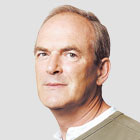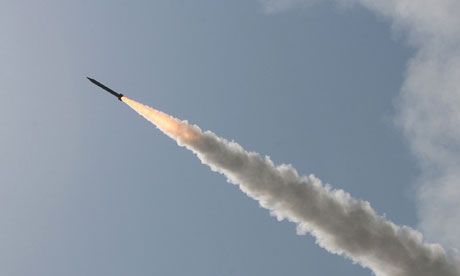US missile defence plans could spark EU-Nato tensions
With the US overstretched, the EU may turn to Turkey and Russia for a security agenda closer to its 21st-century needs

- Simon Tisdall
- guardian.co.uk, Tuesday 19 October 2010 17.37 BST
 Closer co-operation with Russia and Turkey could offer the EU greater protection against a potential Iranian missile threat. Photograph: Shaigan/AFP/Getty Images
Closer co-operation with Russia and Turkey could offer the EU greater protection against a potential Iranian missile threat. Photograph: Shaigan/AFP/Getty ImagesThe Obama administration's drive to persuade Nato countries to back its revamped missile defence plans is bringing longstanding tensions over European security into the open, to the potential advantage of Russia and Turkey, the maverick guardians of the EU's eastern flank.
With a crucial Nato summit in Lisbon only a month away, the US is increasing pressure on Ankara. Defence secretary Robert Gates said this week that Washington would not ask Nato member Turkey to provide new bases for missile systems. "But we do look to Turkey to support Nato's adoption at Lisbon of a territorial missile defence capability," he said. Turkey worries the $280m missile upgrade will be seen to be targeted at next-door Iran – which is indeed its main purpose, in American eyes at least. "We do not perceive any threat from any neighbour countries and we do not think our neighbours form a threat to Nato," said foreign minister Ahmet Davutoglu.
As Turkey's neo-Islamist government tries to juggle east and west, Hurriyet commentator Semih Idiz said "an increasingly apparent ideological divide is growing between Turkey and the US in particular, and Turkey and Europe to a lesser extent … Turkey could easily end up having to choose between the alliance and Iran".
But analyst Sertac Aktan suggested Ankara could turn the situation to its advantage, offering limited co-operation in return for increased American pressure on France and Germany to unfreeze Turkey's EU membership bid. "Deploy new missiles for the sake of Europe? The Europe we so much want to be in but just can't get in?" Aktan asked. "Well, Washington thought about that too and that is why one of the top agenda items of the US-EU summit set to take place right after the Nato summit is going to be Turkey's EU membership."
Russia is also following the missile defence discussions closely, in the context of its desire for closer security co-operation with the EU. Dmitry Medvedev, Russia's president, spent the past two days in Deauville discussing this and other issues with French president Nicolas Sarkozy and German chancellor Angela Merkel. Russia has expressed fears the missile shield could be used to neutralise its defences. But after receiving Franco-German assurances, Medvedev said on Tuesday that Moscow was interested in closer co-operation and that he planned to attend the Nato summit.
The price of Russia's support may cause unease in Washington and London. Medvedev's signature policy is his quest for new "European security architecture" that would inevitably reduce the American role on the continent, and potentially undermine Nato – a historical Russian goal.
France and Germany now appear to be seriously flirting with this idea amid talk of a joint economic and security co-operation zone with Russia and shared EU-Russia forums. To Britain, not invited to Deauville, and the US, this talk begins to sound like a revival of the 2003 French-German-Russian axis against the Iraq war. Though both seek improved ties with Russia, they put the transatlantic alliance first.
Mark Leonard, co-author of a new European council on foreign relations report entitled "The spectre of a multipolar Europe", suggests enhanced co-operation between the EU, Turkey and Russia is both unavoidable and desirable. Current European security structures were dysfunctional, European capitals were pulling in different directions, and "the US is no longer focused on Europe's internal security … and is no longer a European power", he said.
The report argues that the American-directed post-cold war order is unravelling. It had failed to prevent wars in Georgia and Kosovo, disruption of Europe's energy supplies, and ongoing instability on the EU's eastern borders with the Black Sea and Caucasus regions. America was distracted by Iran, the Middle East and the rise of China. Thus the EU must seek new strategic partners.
"An informal 'trialogue' involving the EU, Turkey and Russia should be established," Leonard said. Turkey was an emerging regional power. To keep Ankara on side, its EU membership application should be fast-forwarded.
At the same time. Europe should directly engage Moscow's new "westpolitik", he said. "A European security identity should be fostered by encouraging the involvement of Russia in projects like missile defence."
Britain's Conservative-led government is unlikely to support an enhanced role for the EU over Nato. But others may do so. In this way, it is argued, Europe may eventually replace the American-led security agenda with one of its own, more closely tailored to its 21st-century needs.
No hay comentarios:
Publicar un comentario